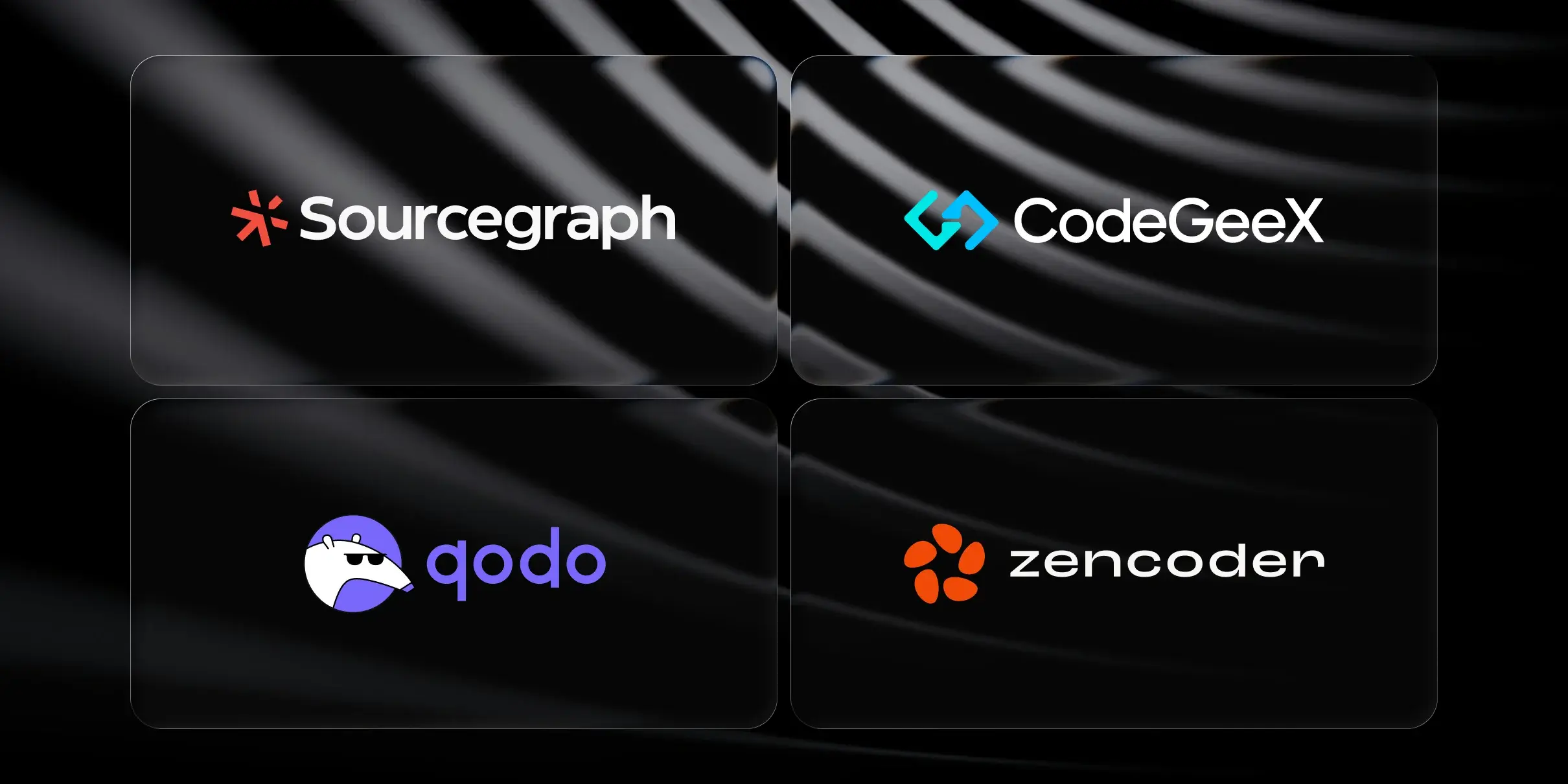The Importance of Context in AI Coding Agents
Context significantly influences an AI coding agent's ability to understand and generate relevant code.
In 2016, AlphaGo demonstrated remarkable contextual understanding, defeating human experts and bringing AI capabilities into the spotlight: a milestone reflecting the importance of contextual awareness in sophisticated AI systems.
Yet, it's far more intricate when involving code. An AI coding agent's comprehension extends beyond syntax, in fact as it must grasp the developer's intent, project constraints, and the underlying problem it aims to solve.
Achieving this depth of understanding requires robust context-aware models that can adapt to various programming paradigms, customer requirements, and real-world scenarios, ultimately leading to more accurate and tailored code generation.
Contextual knowledge is the cornerstone for developing autonomous agents that can act as capable coding assistants, helping to bridge the gap between merely functioning and truly excelling.
Overview of Training Challenges
Training context-aware AI coding agents presents multifaceted challenges that demand meticulous attention to detail.
Foremost, it necessitates extensive datasets rich in contextual information, encompassing diverse coding scenarios, languages, and project environments. These datasets must not only be comprehensive but also representative of the myriad of coding conventions and styles prevalent in the programming community.
Moreover, capturing the nuances of context in coding is inherently complex. It involves not just the direct code but also comments, documentation, user stories, and other meta-information that influences the final output.
Integrating domain-specific knowledge further complicates the training process, as it requires continuous updates and validation to maintain the AI's relevance and effectiveness. These challenges underscore the need for advanced techniques and collaborative efforts to enhance the training of context-aware AI coding agents.
Data Collection and Quality
Training context-aware AI coding agents demands high-quality, context-rich datasets. These datasets should span a broad spectrum of programming languages and styles to ensure robustness and adaptability.
In practice, sourcing these comprehensive datasets involves aggregating vast amounts of code from diverse environments, including open-source repositories, enterprise solutions, and academic research. This aggregation ensures a well-rounded perspective on coding best practices and variations.
Thus, the term “garbage in, garbage out” holds profound significance in the realm of AI training.
The Need for High-Quality, Context-Rich Datasets
The efficacy of AI coding agents hinges on meticulously curated datasets embodying the intricacies of real-world code.
These datasets must capture the nuances of various programming paradigms, encompassing a broad array of languages, frameworks, and coding styles. Sourcing such comprehensive datasets often involves mining vast repositories of code from open-source projects, enterprise applications, and academic literature.
Without these high-quality, context-rich datasets, the AI coding agents will struggle to produce accurate and relevant code. The resulting outputs may lack the sophistication and practicality needed in dynamic coding environments.
Overcoming Data Scarcity and Diversity Issues
Addressing the scarcity and lack of diversity in training datasets is paramount for developing robust AI coding agents.
Here are some best practices that can be followed to achieve that:
- Collaborate Widely: Form partnerships with educational institutions, tech companies, and open-source communities to access diverse codebases.
- Crowdsourcing: Leverage the power of crowdsourcing platforms to gather varied coding examples from developers worldwide.
- Synthetic Data: Generate synthetic datasets that simulate a wide range of coding scenarios and contexts.
- Advanced Web Scraping: Implement sophisticated web scraping techniques to extract valuable coding data from online repositories and forums.
- Data Augmentation Techniques: Use machine learning to create variations in existing code samples, enhancing diversity.
Developing versatile models requires a multifaceted approach to data collection, considering scalability to handle ever-growing datasets efficiently. So, by implementing these strategies, we can mitigate issues related to data scarcity and enhance the contextual comprehension of AI coding agents.
Complexity of Contextual Understanding
When we delve into the intricacies of contextual understanding, the challenge of accurately interpreting various coding environments emerges starkly. Achieving this requires not only an extensive breadth of knowledge but also a nuanced grasp of the specific intricacies that influence code behavior, such as language syntax, programming paradigms, and domain-specific conventions.
This complexity necessitates sophisticated modeling techniques and substantial computational resources to ensure that AI coding agents can effectively understand and generate contextually appropriate code.
Challenges in Modeling Context
Modeling context within the realm of AI coding agents demands rigorous, multifaceted approaches that encompass both syntactic and semantic dimensions.
For instance, a variable's meaning can shift depending on scope, definition, and usage. Here's a Python example that demonstrates how context (such as variable states) can change based on scope, and how we can manage it using functions and modules:
|
# Example of managing context (variable state) in Python |
Capturing these subtleties requires advanced machine learning techniques, like context-aware embeddings and attention mechanisms.
Moreover, context dependencies can become intricate, needing models capable of tracking variable states across functions and modules.
In summary, the quest for precise context modeling is intricate. Sophisticated solutions are required to imbue AI coding agents with genuine contextual understanding.
Techniques for Enhancing Contextual Comprehension
Enhancing contextual comprehension presents notable challenges and opportunities.
First, leveraging advanced language models stands as a foundational method. These models can capture the intricate dependencies within and across code snippets, thanks to their layered architecture and vast training corpora. Consequently, our AI coding agents benefit from improved contextual reasoning, gaining a deeper understanding of code semantics.
Another viable approach is data augmentation. In fact, by diversifying training datasets - not just with more code examples but with rich annotations specific to various contexts - we can fortify our models against context-specific ambiguities.
Additionally, transfer learning represents a game-changing technique, significantly contributing to the scalability of our models. By pre-training models on extensive datasets and fine-tuning them on domain-specific codebases, we can achieve significant gains in context-aware comprehension, allowing our models to excel in an array of coding environments.
Computational Resources and Infrastructure
Developing context-aware AI coding agents demands state-of-the-art computational resources and infrastructure. The challenge lies not only in the high computational demands required for training these sophisticated models but also in the need to balance performance and resource constraints.
To achieve this balance, investing in specialized hardware such as Graphics Processing Units (GPUs) and Tensor Processing Units (TPUs) is crucial. These investments ensure that our AI coding agents can perform real-time contextual recognition and code generation without compromising efficiency.
Thus, “real-time” and “efficiency” become synonymous with the models' operational success.
High Computational Demands
Training context-aware AI coding agents requires immense computational power and advanced infrastructure. Here’s why:
- Intensive Computations: Training models involve complex algorithms and extensive data processing, demanding substantial computational resources.
- Specialized Hardware: GPUs and TPUs are essential for accelerating the training process and managing large datasets effectively.
- Resource Allocation: Efficiently balancing computational resources to maximize performance while minimizing costs remains a significant challenge.
These demands are not merely technical but also financial and logistical.
So, we must invest in high-performance hardware and innovative resource management strategies to meet these challenges head-on.
Balancing Performance and Resource Constraints
Crafting high-performing AI coding agents necessitates significant computational resources, raising the stakes for achieving efficiency and effective automation without overshooting the resource budget.
In practice, balancing performance with resource constraints is akin to walking a tightrope where maximizing effectiveness and minimizing resource usage are vital. This endeavor becomes even more critical when deploying these models in environments with varying computational capacities.
Also, fine-tuning algorithms to achieve optimal performance requires a deep understanding of hardware capabilities and software optimizations.
Notably, such fine-tuning is not a one-time effort. As technology evolves, in fact, system requirements and capabilities also change, necessitating recurring evaluations of performance-resource balance. Thus, staying ahead of these changes demands a commitment to continuous improvement and adaptation.
Ultimately, achieving equilibrium between performance and resource constraints mandates synergetic efforts, including leveraging cloud computing, optimizing code for efficiency, and employing machine learning techniques specifically designed for low-power environments. These collective efforts will ensure our AI-driven coding agents maintain their edge while operating within sustainable resource boundaries, pushing the frontier of what's possible in AI-driven code generation.
Integration of Domain-Specific Knowledge
Integrating domain-specific knowledge requires a nuanced and multifaceted approach.
Each coding domain, in fact, manifests unique patterns, terminologies, and problem-solving methodologies that must be accurately imbued into the AI models. By embedding specialized knowledge into training datasets, we facilitate more precise and contextually appropriate coding solutions. However, the intricate variability across domains demands sophisticated algorithms capable of discerning subtle differences, thereby ensuring our AI coding agents consistently produce high-quality, domain-relevant code.
Incorporating Specialized Knowledge into AI Models
Embedding specialized knowledge into AI models is crucial in enhancing their ability to produce domain-relevant code.
Here are some idea to implement:
- Domain-Specific Datasets: Curate and utilize datasets rich in terminologies and code patterns unique to the domain.
- Expert Collaboration: Engage domain experts in the training process to ensure nuanced understanding and accuracy.
- Contextual Embedding Techniques: Implement advanced embedding techniques to capture the subtleties of each domain.
- Domain-Specific Modules: Develop and integrate modular components tailored to specific coding requirements.
- Continuous Learning Systems: Employ iterative learning processes to continuously adapt and refine domain-specific knowledge.
Collaboration with industry experts ensures that the AI models are informed by real-world applications.
By incorporating these strategies, we bolster the AI's ability to understand and generate code that meets the precise needs of specialized domains.
Addressing the Diversity of Coding Domains
The vast landscape of coding domains presents a multifaceted challenge for AI coding agents, pushing us toward sophisticated solutions.
Different programming languages, frameworks, and libraries shape the coding ecosystem and this diversity requires AI to navigate a labyrinth of syntaxes, paradigms, and conventions, demanding a robust and adaptable architecture. So, the AI not only needs to understand varied coding styles but also has to manage domain-specific idioms and optimization techniques.
To effectively address these challenges, we must ensure access to an extensive and varied dataset that captures this breadth of coding scenarios. Collaboration with programmers and domain experts to annotate and refine these datasets is essential. Furthermore, incorporating learning models that can seamlessly adapt to new and evolving coding paradigms will be pivotal.
Maintaining Model Accuracy and Consistency
Maintaining model accuracy and consistency - a pillar of contextual understanding - poses a significant challenge. Ensuring that AI consistently outputs precise and contextually appropriate code requires a rigorous system for validation and refinement, especially as it encounters diverse and evolving coding standards.
Let’s see how.
Ensuring Accuracy Across Various Contexts
Ensuring accuracy across various contexts is paramount for the efficacy and reliability of autonomous agents in AI coding systems. Here’s how we can achieve it:
- Contextual Variations: Handling differences in coding styles, languages, and implementation methodologies.
- Dynamic Environments: Adapting to real-time changes in development environments and practices.
- Anomaly Detection: Recognizing and correcting deviations that could induce errors or inefficiencies.
- Validation Rigorousness: Implementing stringent validation protocols to maintain high accuracy.
So, incorporating a robust mechanism for continuous learning is essential for optimal performance over time, as the ability to contextually align AI-generated code demands sophisticated algorithms that adapt and learn dynamically.
Strategies for Continuous Learning and Adaptation
In the quest for continuous learning and adaptation, we must address several critical components: this is why continuous learning ensures AI coding agents evolve and stay relevant.
Firstly, leveraging incremental learning techniques plays a crucial role in maintaining up-to-date models.
Second, establishing a robust feedback loop from real-world deployments enriches the training process.
Additionally, we should consider utilizing reinforcement learning strategies to enhance contextual adaptability.
This approach not only refines the AI's decision-making but also improves its coding precision over time. Ensuring an ongoing infusion of diverse and high-quality data promotes sustained model accuracy.
Ultimately, fostering a culture of continuous improvement is vital for AI's success. Consistent updates and refinements significantly elevate the agent’s contextual understanding capabilities.
Ethical and Security Concerns
Ethical and security considerations significantly influence the development and deployment of context-aware AI coding agents.
We need to address, for example, handling sensitive information ethically while ensuring compliance with data protection regulations. Given the opacity of some machine learning models, it is essential to implement transparent and accountable AI practices.
Terms like "data breaches" and "privacy violations" should not be associated with AI's advancement.
Handling Sensitive Data in Contextual Models
Handling sensitive data in context-aware AI models is paramount for ensuring data privacy and adherence to regulations.
Here's how to do so:
- Data Anonymization: Implement robust methods to anonymize sensitive data before AI model training.
- Secure Data Storage: Use encrypted databases and secure data transmission protocols to protect sensitive information.
- Access Controls: Enforce strict access control measures, granting data access only to authorized personnel.
- Compliance Checks: Regularly audit data handling processes to ensure compliance with relevant data protection laws.
- Ethical Training Practices: Incorporate ethical guidelines into AI training protocols, ensuring transparency and accountability.
Adopting these practices reduces the risk of data breaches and privacy violations, but we must consistently update our strategies to align with evolving data protection standards.
Ensuring Ethical AI Training Practices
Ensuring ethical AI training practices is essential for building trust and reliability in AI coding agents. Here are some:
- Transparency: Maintain clear documentation of data sources and training methodologies.
- Bias Mitigation: Implement techniques to identify and reduce biases in training data.
- Human Oversight: Integrate human review into critical stages of the training process.
- Fair Usage: Ensure AI models are used in ways consistent with ethical guidelines.
- Accountability: Establish mechanisms to hold developers and organizations accountable for AI behavior.
By adhering to these principles, we can foster responsible AI development.
Also, as proactive measures are necessary to address ethical dilemmas as they arise, our ongoing commitment to ethical standards will help shape a positive future for AI technology.
Future Directions and Potential Solutions
Innovative approaches to AI training can leverage advancements in federated learning, where decentralized data collaboration improves model accuracy while maintaining privacy. Additionally, hybrid models combining symbolic and neural methodologies show promise in enhancing contextual understanding.
Collaborative efforts across academia and industry can drive the development of these technologies, paving the way for robust, context-aware AI coding agents.
Let’s discuss how.
Emerging Technologies and Innovations
The landscape of AI coding agents is evolving swiftly with emerging technologies continually pushing the boundaries of what's possible.
For instance, we are witnessing significant strides in federated learning, which enhances model accuracy while safeguarding data privacy. This decentralized approach facilitates collaboration without the need to share raw data, a considerable leap in addressing privacy concerns.
Furthermore, innovations in hybrid models that combine symbolic and neural methodologies are becoming mainstream, enhancing contextual comprehension. These developments underscore the crucial synergy between academic research and industry application, as evidenced by recent breakthroughs in natural language processing and domain-specific language models. By embracing these cutting-edge technologies and focusing on scalability, we can surmount many inherent challenges in training context-aware AI coding agents, setting a promising trajectory for future advancements.
Collaborative Efforts in AI Training
Collaboration lies at the heart of progress.
Academic institutions, industry leaders, and AI researchers must join forces. This united front can lead to more robust frameworks for developing context-rich AI coding agents, driven by an exchange of groundbreaking ideas and shared knowledge. Together, we can tap into disparate experiences and expertise, enhancing both theoretical and practical aspects of AI training.
Also, let’s remember that even open-source initiatives drive collaboration. In fact, by pooling resources and contributing to shared repositories, we democratize access to state-of-the-art tools and datasets. This openness encourages innovative solutions that may otherwise be stifled in isolated efforts.
Collectively, these collaborative strategies pave the way for more resilient and contextually aware AI coding agents, and such concerted efforts can accelerate our trajectory towards more intuitive and adaptable AI solutions, addressing ever-evolving demands in the digital landscape.
Conclusions
Training context-aware AI coding agents is a formidable task given the multifaceted challenges.
The intricacies of data collection, model accuracy, and computational demands highlight the complexity of developing robust, contextually aware systems. By addressing data quality, scarcity, and diversification, we can enhance the contextual comprehension of AI coding agents, ensuring they generate meaningful and accurate code.
Finally, to navigate the future, we must invest in emerging technologies, prioritize high-quality datasets, and foster partnerships across sectors. Through persistence and ingenuity, we can pave the way for more advanced and reliable context-aware AI coding agents that meet the growing complexities of the digital realm.

![Spec-Driven Development: Everything You Need to Know [2026]](https://zencoder.ai/hubfs/Cover-Feb-17-2026-08-47-58-1236-PM.webp)

